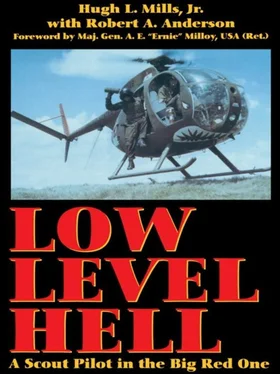The observer would also string smoke, gas, and incendiary grenades on wires all over the front of the cockpit. Wires were hooked anyplace they could be on the side of the ship, and then connected to the ship’s instrument panel. That provided room for extra grenades to be attached by their spoons to various places on the aircraft. Sometimes, they were even stuck in holes in the instrument panel if instruments had been removed for repair.
The weight of the three crew members left no room for a minigun and ammunition. Scouting policy, as established by Major Cummings and John Herchert, was that a scout was to scout—nothing else. The scout half of the Loach-Cobra team was to find the enemy and, if fired upon, drop smoke and call in the Cobra to shoot up the place. The scout usually didn’t even go back into the area to recon it after the gun made its passes.
I was aware that probably nine or ten sets of the XM27E1 minigun kits for the OH-6 were sitting in storage over at aircraft maintenance. But they had never been installed on the ships. The reasoning was that, with a minigun on the aircraft, the Loach pilot would be concentrating on shooting and not focusing on the scouting requirements at hand. It was not a scout’s job, according to Herchert, to try to kill the enemy—just to find him for the Cobras.
It always seemed to me that the enemy, under those rules, had more control of his situation than we did. All Charlie had to do when a Loach got too close was to rip off a burst or two in the scout’s general direction, and the OH-6 was gone, probably for good.
My first scout orientation flight was with Bill Jones, Darkhorse One Eight. On that first flight, I flew as the observer, in the left front seat. I was to be the third set of eyeballs on the mission, my initial VR-1 (visual reconnaissance team 1) operation. The date was 24 March 1969, and we were scheduled to depart at 0530.
We flew in the company of our “snake” (Cobra gunship) and headed for a recon of the Michelin rubber plantation, located about forty-five kilometers northwest of our base at Phu Loi. One scout and one Cobra usually comprised the hunter-killer team, and VR-1 was always the first regularly scheduled helicopter flight to go out in the early morning for normal reconnaissance of enemy activity.
The Michelin was known to contain large concentrations of enemy troops—a perfect place for me to start learning how to scout.
Dawn was still fifteen minutes away when Jones and I climbed aboard the OH-6 and strapped in The crew chief was always the last one to get into the ship. It was his job to unsnap the fire extinguisher that was stowed at the pilot’s right foot and stand fire guard at the rear of the ship while the pilot was cranking. He watched the engine section and, in case of a fire on start-up, he would alert the crew and allow them to exit the aircraft while applying the extinguisher.
While One Eight was running up the engine, he asked me to get on the radio and check artillery. Our flight was to take us from Phu Loi up to the vicinity of Dau Tieng, then on over the Michelin. The point in checking artillery activity was, as Jones subtly put it, “My whole day would be ruined if we fly into our own artillery rounds on the way up there.”
When Jones had the aircraft at full running RPMs, he called the Phu Loi tower for clearance. The crew chief had replaced the fire extinguisher in the aircraft and climbed back aboard to secure his seat belt and monkey strap harness.
As we departed and cleared the perimeter fence outbound, the door gunner armed his M-60. He pulled the bolt to the rear, locking it in place, then lifted the feed tray cover, pulled on the safety, and inserted a belt of ammunition. The belt was tied directly to the fifteen hundred to three thousand rounds of linked ammo in the wooden box at his feet. He was then ready to fire with just the flick-off of the gun’s safety.
En route, Jones lined up on the usual forty-five-degree angle off his Cobra’s left wing and maintained altitude at fifteen hundred feet. This altitude kept us out of the range of enemy small-arms ground fire.
I kept a close eye on One Eight and paid careful attention to everything he was doing. There really wasn’t much for the observer to do until the mission area was reached. I also noticed the team coordination between the scout pilot, the scout gunner, and the observer. It was evident that the scout pilot was the cement that held the team together.
We were nearing Dau Tieng. Off at about two o’clock I could see the tall, straight, tightly interwoven rubber trees of the Michelin plantation. They looked lush and beautiful.
One Eight had told me that the area below us was loaded with enemy soldiers, who felt secure there for a couple of reasons. First of all, the thick foliage made it nearly impossible to detect movement or military activity. Second, the bad guys were aware that the United States was reluctant to create an international incident and would avoid going into the plantation after them, and possibly shooting up the invaluable rubber trees!
Jones was now on the radio talking to his gunship, asking about the rules of engagement for this mission. This was always done before a scout ship descended into the area to be worked. In some mission areas, the Cobra would instruct the scout to maintain a “weapons tight” condition, which meant that the scout was permitted to fire only in self-defense. In other areas the scout had “weapons free” authorization—he could shoot anything that appeared hostile. Weapons free was the order for that day. One Eight was quick to tell me, however, that there was a modifier to both of those weapons conditions, that being the Darkhorse rules of engagement. It was troop law that nobody shot noncombatants or women or children, unless they were shooting at you.
Jones kicked the bird out of altitude and down to treetop level, where we would begin our scouting patterns. Until I had actually taken that helicopter fall from fifteen hundred feet to treetop level, I had no idea how dramatic and violent, how exhilarating and terrifying, that maneuver was. You were moving along comfortably in your aircraft on a horizontal axis. Then suddenly the ship was kicked over into a near-vertical descent, and your stomach felt as though it had just been pitched into the roof of your mouth.
Then, just as suddenly, that movement was followed by a recovery back into a horizontal axis for entry into the search area. The next thing you noticed was how close you were to the trees—how they suddenly were rushing by your feet at what seemed like hundreds of miles an hour, although you were flying somewhere in the vicinity of only sixty knots. But to a fledgling scout pilot, that seemed too damned fast!
All I could see was a sea of green—a blurred rush of foliage beneath the ship’s bubble that was totally indistinguishable. The sensation actually made me airsick. The only way I could even briefly relieve my nausea was to concentrate on something in the cockpit that was not moving.
I wondered how in the hell a scout pilot was supposed to see anything on the ground flying like this. I had flown low level before, but always concentrating on my piloting, not on what was passing beneath me.
“Always,” Jones said after we were down, “come out of altitude in an irregular manner.” In his own quiet, almost philosophical way, Jones continued to instruct me over the intercom. “Remember back at Rucker how they taught you to come down in a standard flight school spiral… how to do those broad, regular, descending orbits that were just as predictable as going down a spiral staircase? Well, don’t ever do that when you’re scouting. It’s not all that difficult for an enemy to determine your descent pattern and angle. He’ll fix where you’re going to come out over the ground, orient all his weapons in that specific area, and put his rounds right into your gut.” That made sense to me.
Читать дальше












